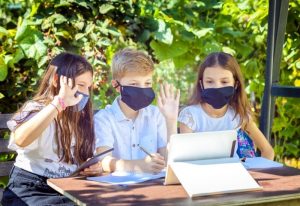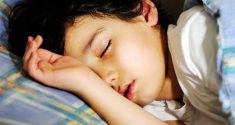A broad study conducted by University of Washington researchers has found that the pandemic disrupted kids’ sleep in ways primarily related to the disruption of their schedules, the reduction of time spent outdoors, restricted social interaction and increased worry and anxiety.
Published in Sleep Medicine Reviews, this study was one of the biggest meta-analysis projects done to date, involving 250 research papers covering 49 countries and about 493,000 people. Fortunately, for most children, reestablishing sleep quality is a fairly simple process involving consistently applied sleep hygiene techniques.
Understanding How the Pandemic Disrupted Kids’ Sleep
 University of Washington Medicine psychiatrist and sleep specialist Dr. Michael Vitiello, who served as lead author on the study, said that the rate of sleep problems among children rose from 25 percent before the pandemic to 46 percent during the pandemic. That almost doubling of sleep disturbances in children represented one of the largest group impacts overall of COVID-19 on sleep. Vitiello pointed to a number of pandemic-related contributing factors to explain the surge in sleep issues among this particular group.
University of Washington Medicine psychiatrist and sleep specialist Dr. Michael Vitiello, who served as lead author on the study, said that the rate of sleep problems among children rose from 25 percent before the pandemic to 46 percent during the pandemic. That almost doubling of sleep disturbances in children represented one of the largest group impacts overall of COVID-19 on sleep. Vitiello pointed to a number of pandemic-related contributing factors to explain the surge in sleep issues among this particular group.
With the school closures and assorted other lockdowns and restrictions, day-to-day schedules were quite disrupted, including sleep and wake times, social activities and physical activity routines. These sorts of disruptions can impact the circadian rhythm, delay sleep timing and negatively impact sleep quality. While the impact of going to sleep later than usual is fairly obvious – it can be more difficult to wake up at the usual time – other pandemic related disruptions can be a bit more subtle in their effect.
Staying up later is likely to involve electronics, such as gaming systems, mobile phones or tablets, all of which emit melatonin-suppressing blue light. Even late evening exposure to just the regular types of household bright lights can have a suppressive impact on melatonin levels. When the hormone melatonin, produced as the day’s light wanes and the dark of evening and night arrives, is suppressed, sleep timing is delayed because that hormone plays a key role in feeling sleepy.
Because of the lockdowns and restrictions, many children got less morning sun exposure and less physical activity than usual, both of which can impact sleep quality. Morning sun exposure is important to circadian rhythm health and function. One of the tasks of the circadian rhythm is to help regulate the sleep-wake cycle. Physical activity has a direct impact on sleep quality.
Worry, stress and anxiety all can impact sleep quality. The pandemic brought a lot of that to many children via fear related to COVID-19, the switch from classrooms to remote learning, restrictions that sharply limited social activities with friends and more. Furthermore, many children picked up on their parents’ stress and worry as jobs and finances were impacted by the pandemic as well as their health concerns. Children often are not as well-equipped as adults when it comes to managing emotional and psychological stressors.
Simple, Effective Sleep Hygiene Techniques to Regain Sleep Quality
It’s very easy for sleep disturbances to become a lasting sort of pattern in children, continuing to impact sleep quality even as the pandemic itself is waning. Fortunately, reestablishing healthy sleep patterns and regaining overall sleep quality is, in most cases, a fairly simple process. Base your approach on consistently applied sleep hygiene techniques.
For a parent of younger children, the concept of setting regular sleep and wake times is almost a no-brainer. However, this concept applies over all age groups, including your own. It may be difficult to achieve with older children and teenagers, but it is very much worth the effort when it comes to sleep quality and circadian rhythm health. It may require taking a hard look at the impact of extra-curricular activities that can impact the daily schedule and possibly limiting their number.

Develop an evening routine that includes a wind down and relax period before bedtime. A bath or shower can be helpful. Make sure the bedroom is comfortable; not too warm or too cold. There should be no television in the bedroom. If there is a computer in the bedroom – in the best case scenario, there is not – it should be shut down.
Consistency is the Key
As with most things having to do with children, consistency is the key. This is especially true of sleep hygiene. You have the opportunity to develop good, healthy habits that will help preserve health and well-being over a lifetime. Use that opportunity well.







